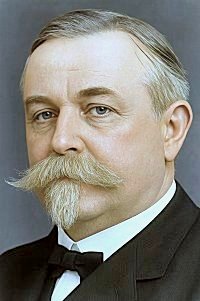James was the son of George McGranahan and Jane Blair, and husband of Addie Vickery.
Even the festivities of the Christmas season that December of 1876 couldn’t drive them from his mind—those notes his friend Philip had written to him just a few days before the holiday. He read them over and over again and almost decided to yield to the urging of their message—almost, but not quite. His dreams of personal ambition were still too precious. How could he give them up?
James McGranahan was a talented and cultured American musician who lived from 1840 to 1907. He was gifted with a rare tenor voice and studied for years with eminent teachers who urged him to train for a career in opera. Of course, this advice opened up to his imagination dazzling prospects of fame and fortune. And he was assured time and time again it was all within his grasp.
James McGranahan was a Christian, and he had a Christian friend Philip P. Bliss who was concerned about him. His friend was also a capable musician who had gone through many of the same experiences in his younger days as a singer. However, he had been sensitive to the claims of the Lord on his life and had yielded his talents to God for full-time Christian service.
Though only two years older than McGranahan, Philip Bliss, at 38, had a good dozen years of Christian work behind him. He was then serving as a gospel soloist with the great evangelist Major D. W. Whittle. How he thrilled to the response of the great crowds who gathered for their campaigns and to the working of the Holy Spirit through his music! He longed for his friend James to know that thrill as well!
Philip Bliss and his wife were preparing for a trip home to Pennsylvania for Christmas. There was much to be done, but in the midst of all the bustle and hurry Bliss felt strangely compelled to take time out to write McGranahan a letter. He kept thinking of his 36-yearold friend, who was still studying music, still preparing for—what? Would it be opera or would it be the Lord’s work?
Philip Bliss prayed as he wrote that he would know the right words to put down. He knew the Lord was dealing with James and was eager for his friend to make the right decision.
Finally the letter was done. Bliss, needing encouragement and approval for what he had said, read it to Major Whittle. In the letter he compared McGranahan’s long course of musical training to a man whetting his scythe for the harvest. The climax came as he strongly urged, Stop whetting the scythe and strike into the grain to reap for the Master!
The letter was sent on its way and quickly reached its destination. Those words touched James McGranahan as no others had before. He could think of nothing else. Strike into the grain to reap for the Master…to reap for the Master…to reap for the Master!
Day and night those words were before him.
One week later, December 19 [actually, December 29], 1876, the man who had penned the words was dead. The train returning the Blisses from Pennsylvania to Chicago where Philip was scheduled to sing at Moody Tabernacle broke through a railroad bridge at Ashtabula, Ohio. It plunged into a 60-foot chasm and caught fire. Among the 100 who perished in the disaster were the 38-yearold gospel singer and his wife.
When James McGranahan received news of the tragedy he rushed immediately to the scene of the accident. And it was there, for the first time, that he met Major Whittle.
The evangelist later recorded his thoughts on the occasion: Here before me stands the man that Mr. Bliss has chosen to be his successor.
The two men made the return trip to Chicago together, and as they rode they talked. Before they reached the city James McGranahan decided to yield his life, his talents, his all to the service of his Savior. He would strike into the grain to reap for the Master.
The operatic world lost a star that day, but the Christian world gained one of its sweetest gospel singers. James McGranahan was greatly used in evangelistic campaigns throughout America, in Great Britain and in Ireland.

